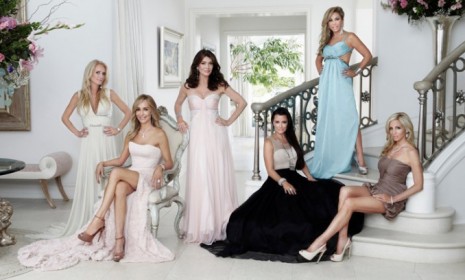Should there be a reality TV code of ethics?
NPR's Linda Holmes argues that industry-wide standards are necessary to prevent tragedies like the recent suicide of a Real Housewives cast member

A free daily email with the biggest news stories of the day – and the best features from TheWeek.com
You are now subscribed
Your newsletter sign-up was successful
Bravo agreed to broadcast suicide prevention PSAs in the aftermath of the headline-making suicide of Russell Armstrong, the disintegration of whose marriage was brutally documented on Bravo's The Real Housewives of Beverly Hills. But what reality television really needs is "a voluntary, industry-adopted ethics code," says Linda Holmes at NPR. Voyeuristic viewers will never stop hungering for the emotional warfare that reality TV supplies, so the least networks can do is create — and abide by — standards that limit the psychological toll these shows take on their participants. That could mean limiting alcohol consumption, instituting mandatory counseling, making contracts public, and requiring that contestants get a reasonable amount of sleep. Is it time for a reality TV code of ethics?
Yes. Industry-wide standards are a must: Reality show participants — rarely aware beforehand of what they're truly getting into — are at the mercy of producers, says Aidan Morgan at MamaPop. A code of ethics is necessary to protect them. And it could protect shows, too. As the genre becomes more popular and its stars more exploited, expect more tragedies like Armstrong's. "The television industry will start having to watch its back," and this code could help.
"A code of ethics for reality television? It's high time"
The Week
Escape your echo chamber. Get the facts behind the news, plus analysis from multiple perspectives.

Sign up for The Week's Free Newsletters
From our morning news briefing to a weekly Good News Newsletter, get the best of The Week delivered directly to your inbox.
From our morning news briefing to a weekly Good News Newsletter, get the best of The Week delivered directly to your inbox.
No way. A code is unnecessary: Reality show participants aren't exactly innocent, says Jaime Weinman at Maclean's. The truth is that they often do know what they're getting into. Indeed, many participants are exploiting shows — "for fame, and the good things that come with it" — as much as shows exploit them. Plus, the adoption of such standards could have a chilling effect on television and make reality shows a lot less fun to watch.
"This is all a pipe dream": The notion that reality TV producers and their networks would voluntarily adopt an ethics code "is laughable on its face," says Matt Zoller Seitz at Salon. "Humans can be astoundingly greedy and stubborn," and the people who are making money off high-octane — if psychologically harmful — reality TV dramas are unlikely to curb their ways unless the government forces them to.
"Should reality TV adopt a code of ethics?"
A free daily email with the biggest news stories of the day – and the best features from TheWeek.com
-
 Quentin Deranque: a student’s death energizes the French far right
Quentin Deranque: a student’s death energizes the French far rightIN THE SPOTLIGHT Reactions to the violent killing of an ultra-conservative activist offer a glimpse at the culture wars roiling France ahead of next year’s elections.
-
 Secured vs. unsecured loans: how do they differ and which is better?
Secured vs. unsecured loans: how do they differ and which is better?the explainer They are distinguished by the level of risk and the inclusion of collateral
-
 ‘States that set ambitious climate targets are already feeling the tension’
‘States that set ambitious climate targets are already feeling the tension’Instant Opinion Opinion, comment and editorials of the day